#olivier levasseur
Text
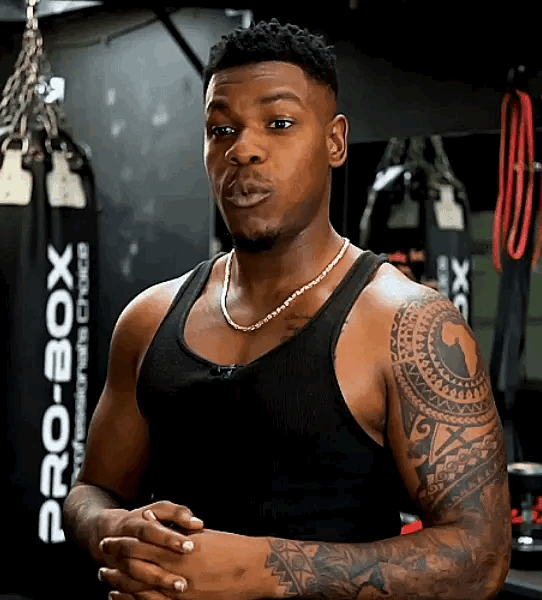
FUUUUUUUUUUUUCCCCCKKKKKKKK
#he should be illegal#i am owed financial compensation#for the heart attacks and all#I love him terribly#olivier levasseur#la buse#la bouche#blow the man down#btmd#alternate reality game#arg
2K notes
·
View notes
Text
I love One Piece
And I love real pirates, so I made this blog to share facts about the real pirates who inspired some of the characters.
Gol D. Roger - Henry Every and Olivier Levasseur
Alvida - Awilda
Calico Yorki - Calico Jack Rackham
Zeff - "Red Legs" Greaves
Blackbeard and Whitebeard - Edward Teach Actually Whitebeard is closer to Benjamin Hornigold than Edward Teach
Roronoa Zoro - François L'olonnais
Jewelry Bonney - Anne Bonney
Lafitte - Jean Lafitte
Eustass Kidd - William Kidd
Captain Morgan - Henry Morgan
Basil Hawkins - Basil Ringrose and John Hawkins
Urouge - Oruç Reis
X Drake - Sir Francis Drake
Bellamy - Samuel Bellamy
#one piece#gol d. roger#alvida#calico yorki#one piece zeff#marshall d. teach#edward newgate#roronoa zoro#jewelry bonney#one piece lafitte#eustass kidd#one piece captain morgan#basil hawkins#one piece urouge#x drake#one piece bellamy#henry every#olivier levasseur#calico jack rackham#red legs greaves#edward teach#francois lolonnais#anne bonney#william kidd#henry morgan#basil ringrose#bellamy#sir francis drake
20 notes
·
View notes
Text
Why did nobody tell me about the real life Gol D. Roger???
Olivier Levasseur "The Buzzard" (1680s - 1730) was a French pirate known for his wit and ferocious attacks. He originally was a privateer for France during the Spanish Succession, but turned to piracy when the war ended.
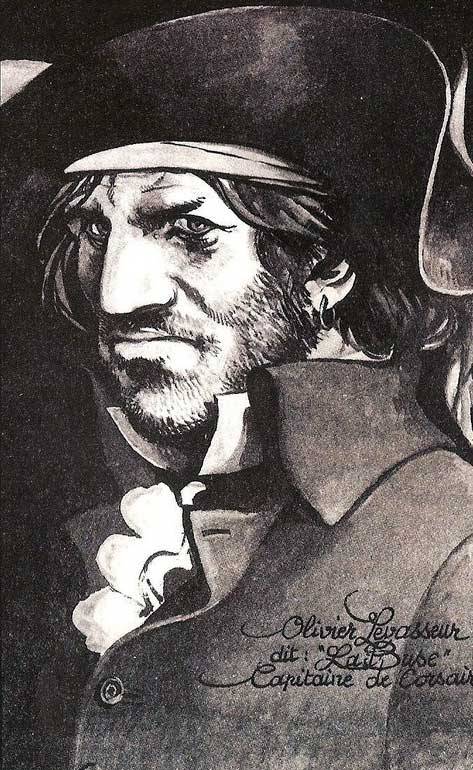
After working with a pirate named Benjamin Hornigold, he captained his own crew. One time, he actually attacked a slave ship from Angola, leaving the crew to die but taking the about 240 slaves and putting them on an island off the coast of Macae.
Levasseur lost a lot of his crew to the Portuguese authority and then about 80 more and his ship in a big storm in an attempt to find a wealthy merchant. He escaped, and plundered from a ship full of cassava flour to feed what was left of his crew.
He found old friends, was named captain again, and then discovered the Portuguese galleon Nossa Senhora do Cabo, one of if not the most prized capture ever made by pirates in the golden age of sail.
This ship was full of treasure, and Levasseur sorted it out within the crew, giving even the lowest ranking pirate £50,000 worth of treasure. It is said that Levasseur got the most treasure, equal to over £1 billion.
Levasseur was eventually captured in Madagascar, and hanged. Before he was executed, he grabbed his necklace and threw it to the crowd, saying "Find my treasure, the one who may interpret it!"
On the necklace were lines of code. Although the code was eventually translated into plain, no one could figure out the message.
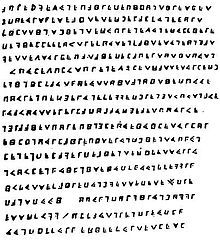
Oda confirmed that Gol D. Roger is indeed based on this man.
One Piece fans should unite to create a crew so vast so that we can find the real One Piece!
#one piece#gol d. roger#olivier levasseur#pirates#roger pirates#the one piece is real#everyone select your roles in this ginormous crew!#history
20 notes
·
View notes
Text
Javid Denkins is not interested in answering questions.
It's 9:30 in the morning and I'm sitting across from Denkins in a conference room at the AMC Studios offices. Denkins declined to meet anywhere more personal than this beige and glass room, impersonal Muzak buzzing through the speakers, windows overlooking an empty studio lot. There are posters on the wall but none, strangely, for Blow the Man Down, the runaway hit Denkins conceived, writes, and now showruns.
Blow the Man Down, or BTMD as it's frequently referred to by fans and journalists alike, is a workplace comedy set in the Golden Age of Piracy. This unusual premise would be interesting enough even without the top-tier leads brought on by AMC to play opposing pirate captains Sam Bellamy and Olivier Levasseur—Oscar Issac and John Boyega light up the screen and bring surprising comedy chops to the pirate-filled stage they share with such talents as Michelle Yeoh ("Zheng Yi Sao") and Sam Neill ("Captain Benjamin Hornigold").
But beyond that, BTMD seems to be that rare thing in mainstream media: a slow romance between two middle-aged men finding love for the first time. The first—and so far, only—season ends on a cliffhanger, our heroes separated by an ocean but determined to reach one another, and their love story—if it is one—stays unresolved.
Usually an interview like this—between seasons, after renewal and filming but before advertising—would be the perfect opportunity to delve into the mind behind the magic and attempt to tease out hints about what's to come.
But Denkins seems determined to ignore Hollywood's traditional playbook.
Whether this is the standard conference room used for interviewing reluctant showrunners, or if Denkins picked it especially for the purpose, I'll never find out. I've already been waiting half an hour, uncertain if Denkins intends to join me at all. When he does finally arrive, he makes his position clear.
"I'm only doing this because you agreed to my terms," he says.
I'd describe what he looked like, if he had a coffee or a snack or a smoker's twitching nerves, if he sounded tired or amused or angry—but I can't. If you see a description here, it's because Denkins decided, for whatever reason, to approve it. Otherwise, sharing my impression of Denkins is off the table, one of many terms and conditions my editorial team and I had to agree to before Denkins would accept this meeting.
Denkins doesn't want to make my job easy. Photos of him do exist from the few red carpets he's attended; enthusiastic interviews with the cast, writers, and production team of BTMD definitely paint a picture that belies Denkins's apparent efforts to avoid perception. But here and now, in the oppressive air conditioning of the AMC offices, I am contractually obligated to interview a cipher.
If he can be all business, though, then so can I. I hit a button on my phone's recording app, set it down between us, and ask what made him decide to tell the story of an obscure pair of pirates like Sam Bellamy and Olivier Levasseur.
He shrugs. "Why does anyone write anything? This is my job."
It's not the kind of answer I was expecting. Something must show on my face, because he follows with, "That's unsatisfying, isn't it. No definitive answer."
"It's not what I expected," I hedge.
"What did you want to hear?"
I try to gather my thoughts, but I'm definitely stalling, uncertain that this is what Denkins intends. "I did a little research," I say. "Not as much as I imagine you did, but I found some of Bellamy and Levasseur's history together and, later, apart. Bellamy's ship is the only fully authenticated Golden Age shipwreck in the world, so it makes sense that the wrecking of the Whydah is an important turning point in season one. Levasseur, on the other hand, is best known for the mystery of his encoded treasure map, flung into the crowd at his hanging and only ever partially solved, which you seem to have used as a foundation for the coding and decoding motifs throughout. But for a show that seems determined to discuss the consequences of fame and reputation, it's fascinating that you've chosen two men most casual viewers have never heard of."
"Outside the narrative they built for themselves," Denkins corrects. "Is there a question in there?"
I remember again that Denkins isn't here to make this easy for me. "Why not choose one of the more well-known pirates of the era? Henry Morgan, Captain Kidd, and Blackbeard are all arguably more famous both now and when they were alive. What made you choose Bellamy and Levasseur for this story?"
"I think," Denkins says, "I just answered that. There's a difference between how you perceive yourself, and how the world perceives you. Those famous pirates retained their notoriety even after death. Sam and Ollie did have reputations when they were alive, but if people today know them at all, it's typically for reasons completely unrelated to whatever little fame they achieved in life."
"And that fascinates you?"
Denkins looks irritated. "It doesn't matter what fascinates me. That's the story, that's—look, I don't know how to write a puff piece like this," Denkins says. "I don't know if it would really sound like this, if anyone would bother caring enough about what I want to get this far."
"Excuse me?" I say.
"Do you honestly think," Denkins says, "there's a single journalist out there that would actually agree to these interview conditions? This is a fantasy, a what-if, and it still doesn't work."
"What do you mean?"
"I mean," says Denkins, "I didn't even give you a name."
And that's true, I realize. I don't have a name.
"Right," says Denkins, as if hearing my thoughts—and I suppose, in a way, he does. "And you don't know how you got here, and you don't know where you'll go after. I made you up. I made all this up."
I look at my recorder, which isn't a recorder. I look at the room, which isn't a room.
"Okay," I say. "So what did you want to happen?"
Denkins taps my phone's screen to stop the recording. Denkins imagines me noticing that he taps the screen, and so this must have meaning. There is no room for junk words and actions in prose, and even less in television. Whatever's on the page has to have meaning, or it's wasted space, wasted time, a moment that could have been useful now gone and never coming back.
Denkins shoves my phone back to the center of the table and says, "I wanted to see if I could just talk about the story without making it about me."
"But you're part of it," I point out. "You have to be. It came from you. It was something you thought was important, and then you put the effort in to create it. The story exists because of you, in relation to you. That's why people, why fans, want to know more about you. They love the story, and you made it, so they want to love you, too."
"I don't like that," says Denkins. "Rephrase it."
"They love the story," I say, parroting back at my creator, "and you made it. They want to know about you so they can know more about what the story means."
Denkins's chair creaks as he pushes it back, puts his head in his hands. I wonder if he's doing that in the real world, too, in the place where he's imagining this interview that will never exist.
(Except I'm not the one wondering. He is. He's wondering what an interviewer would think of him if he allowed himself to show this weakness. Rephrase. Show this ache. Rephrase. Show this.)
"I'm not a story," Denkins says, face still hidden. The Muzak piped into the room seems too loud, too discordant now. Maybe that's what the world sounds like to him. "I'm not imaginary. I'm not a specimen to study under a microscope until every part of me is uncovered and connected one by one to every part of the show." He drags his hands back down and I think I can say that he looks very, very tired.
"Yes, maybe I put some of myself in Blow the Man Down," he continues. "Maybe I did in season two as well. Maybe I put something in The Gang, and maybe I'll put something into whatever else I make for the next fifty years. And what I put there is—will be—has to be—my choice. All things I chose to share. But this?" He waves a hand at the nonexistent conference room, at nonexistent me. "This isn't a choice. It's a demand. I'm being held hostage for answers, as if me keeping my boundaries somehow ruins the show, ruins the story."
"Because you're not a story," I repeat back, watching for confirmation. "Because what you choose to reveal is the only story the audience should need."
"Yes," says Denkins. "That's it."
That's not it, though. I know this, because I'm him, talking to himself. Thinking all this through.
"So you cut yourself off," I say. "No one can know anything about you, because they're already clawing for what you're not willing to share—so how much worse would it get if you gave them a chance to come closer, right?"
"To take, and get it wrong anyway," he says. "Or get it right, but not like it. Not like me. How I'm perceived might change how the story is perceived. And even skipping over the whole art of it all—this is a business. How the story is perceived affects dozens, if not hundreds of people and careers. And all of it can get destroyed in an instant if there's some aspect of me that the audience decides is wrong."
Denkins pushes back from the table, stands up as if to leave. I'm not done yet, though. He's not done yet.
"Sounds lonely," I say.
"Sounds like something a fan would say," he shoots back, and I shrug.
"Blame yourself for thinking it and making me say it, then. It sounds lonely. It is lonely. It's lonely to think there's no way that you could open yourself up, talk about who you are and what your art means to you, without feeling like someone, everyone, will take advantage of that vulnerability."
I pause, and in that pause I find something to latch onto. "You've imagined me," I say. "You've imagined this scenario, where you stay cut off and oblique and hidden." I pick up my phone from where it's placed between us, and I shut it down completely—not because it exists, but because it's a symbol he understands. "What would happen if you imagined being part of the story?" I ask. Rephrase. "What would happen if you imagined being free?"
We look at each other. The tinny music of this artificial space comes to a sudden halt.
Denkins leaves the room.
I am—
Denkins comes back. He sits down. He looks at me.
Time doesn't exist in the beige and glass room. But behind him, now, there is a poster of Sam Bellamy and Olivier Levasseur, a drilled coin on a cord stretched taut between them. And the Muzak hasn't restarted.
Denkins looks different. Or maybe he just feels different. Those things are functionally the same, here.
"You know the old movie trailers?" Denkins starts, not really a question. "The ones that start with 'in a world…'"
I nod.
He smiles a little. "Okay. In a world where Blow the Man Down doesn't exist. Let's say there's something else instead. Let's say it's called Our Flag Means Death. It's a workplace comedy, it's the Golden Age of Piracy, the works. They even manage to kiss in the first season, though the cliffhanger is worse. And in that world, there's a different guy who runs it, a guy named David Jenkins, who seems nicer and more outgoing and shares a lot more of himself than I do. And I think it goes mostly okay for him, except he has to scrub his social media, delete most of his Instagram, and never gets to name his wife anywhere in case a fan might notice and start following her around."
"Sounds grim," I say.
He shrugs. "It's another way of handling it. David, in that world, has made a choice to draw the enemy fire toward himself, instead of hiding away and letting it scatter at random. It seems to work okay for him, and maybe it would for me too, but, you know. Maybe that's a little of myself I gave Ollie. Because I also like the idea of testing something first, all the way to destruction."
A little of myself. This—this is personal information. Something that, in the negotiations that never happened, he said he'd never give me.
My phone, with its blackened screen, is right there. I keep my hands still, folded together, decidedly not reaching for the phone. Denkins watches, sees. His shoulders loosen; neither of us, I think, realized how tense he'd been.
"In that world," he says, "there's a second season coming that no one knows anything about and there's a fandom going feral. Echo chambers that feed off their own theories because there's nothing new to add to the pot. Just like our world, right? In the absence of good data, overwrought ideology works just as well.
"And in the middle of this, to provide a distraction, maybe, or to draw that enemy fire like he so often does, David Jenkins says he'll get a Tumblr—you know, one of those not-really-social-media internet places. And maybe he does. He doesn't tell anyone his username, so it's a mystery whether he really did it or not. But someone opens an account. And someone says they're definitely not David Jenkins."
Javid Denkins is holding a cup of coffee. So am I, now. We take sips, mirrors of each other. The coffee tastes like it has seven sugars in it.
Denkins swirls his cup gently, not looking up at me. "When you're trying to figure out something that's terrifying," he says, slow and careful, "and enraging, and so big and so much that it feels like you'll collapse under the weight of it…sometimes you need to find a way to conceptualize it more abstractly. Make it manageable. Put it in bite-sized chunks.
"So instead of me, dealing with all this fame, and these expectations, and these pulls to turn me from a person into a plot point…maybe there's this other guy. In this other universe, with this other pirate show. Another writer, who says he's definitely not David Jenkins. But—he could be. He could be. And either way, there's enough uncertainty that the fandom can't tell right away."
"Schrödinger's showrunner," I say.
Denkins tips his mug at me. "Yeah, that gets pointed out, too. Because either it's really him and the fandom will eat at him—death by a thousand needy bites of demand, and something that feels like connection but by its nature can't be—or it's not him, just a fan pretending to be him, attention-seeking, scamming, stealing unearned laurels to crown a meaningless triumph: successfully mimicking the concept of David Jenkins."
"Pretty binary."
Denkins shrugs. "You saw the first season. I'm a sucker for duality."
He hums and looks out the conference room's window. The AMC lot is gone. More accurately, it was never there. Outside the window is an ocean. The water is green-screen perfect, and there are two tall-masted ships in the distance: Bellamy's Whydah Gally and Levasseur's La Louise. They float angled toward one another, counterpart to their captains on the poster behind Jenkins, missing only the drilled coin between them.
"Except," says Denkins, slow and musing as he watches the distant ships, "in the vast multiverse of imaginable possible outcomes, it turns out that there is the very slimmest possible chance of a third thing happening."
There is another ship floating now between the Whydah and La Louise. It's freshly painted, poorly rigged, and its figurehead is a unicorn. Instead of one flag, it has half a dozen. And I know, because Denkins knows, that instead of gunpowder in its hold, it carries jars and jars of harmless marmalade.
"So," I say, "David Jenkins—"
"Oh, definitely not David Jenkins," says Javid Denkins, amusement lighting up his face. He keeps his eyes on that third ship.
"So the person who is definitely not David Jenkins," I say. "He comes and starts a social media account. He answers questions."
"Sort of. Nothing specific, really. Just…narrative likelihoods. Enough to dangle hope. But the fandom wants more. There's a Richard Siken line he sees, that if he'd chosen to stay anonymous maybe he could've actually posted: 'but monsters are always hungry, darling.' It's like that. So he backs up a little, and considers how to hold off the inevitable. The season two hints are vague? Make them vaguer. Add some smoke and mirrors to hide how little substance they have. There are only so many general pirate tropes around? Stretch out how long it takes to get the ones he has. Add steps. Add puzzles. Make the fandom work for it, and maybe they won't notice how little there is to find. Give them an interesting enough box to open, and they'll ignore the fact that there isn't an answer on the inside, just another, smaller box." He tilts his head and looks at me. The light outside is now luminous pink and yellow, flashing off the water and highlighting his face like a duotone painting. "Then he…" Denkins sighs. Puts down his mug. "Then I sit back and see what happens. I see if it's as bad as I think it would be if I did it here, in the real world."
"And is it?"
Denkins reaches out with one hand, tugging my phone over to his side of the table. He starts fiddling with the buttons, attention on it instead of me. "To start with? Yes. And no. It didn't matter that the one thing I promised was that I wasn't David Jenkins. They—the fandom—found me anyway. They assumed I was him. And I was right, of course I was right, they asked me questions. Hundreds of them. Like that was the only reason I existed, like I couldn't just be a regular person like the rest of them, just on Tumblr to read about the Carpathia and get taken out by the color of the sky."
"For better or for worse, you're a public person," I say. "They think they know what it means when a public person breaks down the barrier between themselves and the fans. Even well-meaning people make assumptions."
The recorder is no longer a phone and app; it's an old cassette player with thick plastic buttons like I, or more accurately Denkins, had as a child. It matches the ones his elementary school classrooms had, which in turn looked like the device Mr. Spock carried at his hip to record and interpret data from strange new worlds.
Denkins, in the here and now, half-presses the play and record buttons, which would trigger the record function if pushed down completely. He holds back. Riding the edge of commitment. Over and over.
"Yeah," he says. "Yes. That's true. And I could've been completely anonymous if I wanted to be left alone entirely. I suppose I wanted to prove that everything I believe—everything I'm afraid of—is true, and that I'm justified in hiding away, refusing to be 'known' by anyone I haven't specifically agreed to. Hence the thought exercise. And when I was done, and I had my proof," he says, leaving off the recorder buttons to raise a pointed finger at me, "I wouldn't have to see you again either."
We look at each other. "But here you are," I say.
He laughs. It's rusty, but sure. "Here I am," he agrees.
"So what happened?"
"Turns out," he says, "that in that infinite universe of possibilities a writer can dream up, there's a world where, yes, all my worst fears are confirmed…but that's not all that happens."
He stops, and we are both silent for a long, long moment. His fingertips brush over the recorder buttons, repetitive and soothing, like he's calming something feral and unused to human touch.
"Would you believe," he says at last, hushed and small in this glass and beige room floating on a digital sea, "that there is a world where fans—people—don't ask for more than I want to give? Who see the box I'm in, and instead of ripping it open to grasp for whatever good thing they think they can find inside…they give something back.
"I played it all out, you see." He waves his hand over the recorder. Now there are two of them, sitting side by side, each with a row of thick black plastic buttons along the edge: one to play, one to rewind, one to record, and one to pop open its lid so that the cassette can be changed. One of the recorders is a little bigger than the other. "If I can imagine it," he says, "it has to be possible."
He looks at the two recorders; he's quiet now, talking to himself rather than me. I don't think I'm as necessary as I was before. I think maybe this is just him. Just Denkins in this lonely little room. He moves the smaller recorder so that it's lined up with the larger one, like he's lining up Matryoshka dolls as he reveals them.
"It started small," he says. "There were people who saw my puzzles, and made puzzles back for me, just to play along. People who saw my puzzles, and shared what they knew about them, just to help others play too. Small things. Little things. Possible things. I liked it. I didn't expect it. I…wanted to give back, too. Not just in the story, I mean. It was me who wanted it. Wanted to add to a world, to a community, where that sort of giving could happen. So I went further. I didn't just try to hint at common story beats this other show might hit—I started listening, following, asking what would be most welcome, and then gave that instead. And it grew. It grew until it wasn't really just an experiment anymore. It stopped being an adversarial proof. It started being…something else."
Denkins reaches out, and now there are three recorders on the table. The newest one is the smallest. He lines it up with the others.
"I'd already made David Jenkins," he says, "and in turn he'd made his own Javid Denkins. So why not do it again? This other Javid Denkins, this me who's me but not me, goes deeper. He uses the tools at his disposal. Our Flag Means Death has pirates named Edward Teach and Stede Bonnet. OFMD has a fandom like BTMD does, where people write stories about the characters, for themselves and—for others. Fan fiction. A thing that can be a gift, if you want it to be. So I started to write one."
One by one, Denkins hits the 'play' button on each of the recorders. The cassettes whir, a steady background hum. Each starts playing a part of some orchestral piece. Not the individual instruments, but something stranger. It's as if each cassette contains the whole work, but with fragments missing that the others complete. There are still some gaps in the playback.
Denkins waves his hand over the collection again, and a fourth recorder, smallest of all, appears. He presses play on it too, and the music fills in. It's a pretty little melody. Simple, if you know how to hear it.
Denkins hums a little of it before looking up, seeing me again. "That was it, really. That's what finally made all this small enough for me to understand. Made it small enough, far enough away from my actual world that I could finally let myself feel it. In this story that I'm telling, here is Edward Teach." Denkins touches the smallest recorder very, very gently. "Teach lives in a world where he's not the main character; he's just a fan of a gay pirate romcom called Blow the Man Down. He's tired, and he's angry, and he doesn't know how to deal with the world the way it is, with the fandom as he perceives it. He makes a Twitter account, anonymously, to prove that what he fears is real."
Denkins covers the recorder with both hands, only muffling the music a little. "Here's Edward Teach, made up of all my fears and saying them out loud."
He raises his hands, and now there are two little recorders, the same size, both playing the same parts together. He touches the new recorder with his fingertip, as if it's a bubble that could too easily break. "Here's Stede Bonnet," he says, "made up of all my fears coming true. And then having to live through it anyway." He stares down at this new recorder; the same as the Edward Teach one, but evidently special in some way to Denkins. He says, to me, to it, to the room: "It's a hell of a thing, to need to go so far away just to see what you've been carrying on your back the whole time."
After a moment, he looks back up at me. "In my story," he says, "Stede survives the disaster. My disaster. He survives it, because he has Ed—a love interest, yes, but not just that. He's someone he opened up to. And more than that, I saw—because I could imagine it, and so it must be possible, it has to actually be possible—I saw the fandom become…people."
With both hands, Denkins presses a button on each of these two small recorders.
Their lids pop open.
And from the walls, from the ceiling, from the glass windows and the limitless sea, there comes a multiverse of music.
"These people," says Denkins, tilting his head to listen as the swells of unseen instruments add to the gentle overture of his pocket worlds and turn the piece into something greater than the sum of its parts. "They're not some nameless collective made up of their worst impulses. They're just people. People are complicated. You can never know them completely; they can never know you. All you really get is what they—we—choose to do.
"And I saw people try to help Stede. People, strangers, who didn't know who he was, not really. And they felt compassion anyway."
After a long moment, just taking in the music, Denkins sighs and carefully closes the lids on the two small recorders. The singing universe becomes just a recorded orchestral piece once again—though no less beautiful for it. He gently pushes the two recorders together until they're touching, side by side, and covers them with his hand. He says, "Ed got to see this. He got to know that even if his worst fear happens, he'll be okay on the other side of it. And he won't be alone."
He lifts his hand; the two are now one, still playing its little melody.
Denkins picks up this amalgamated recorder and sets it on top of the next largest. He puts his hand over the stack he's just made. "Move it up a level," Denkins says. "David Jenkins, or someone who is definitely not David Jenkins, runs a Tumblr with games and puzzles and digital tools that stretch the boundaries of the narrative. He sees the reactions to his story. Sees fans who know it isn't real, who know that Stede and Ed are characters in a narrative—and nevertheless, these fans, these people, see that these characters are hurting. They try to help. They don't know who's behind the masks labeled 'Stede' and 'Ed,' not really. But they feel compassion anyway."
He lifts his hand. The little recorder atop the larger is gone. The music is different. Not lessened, but changed. It's come closer.
Once more, Denkins moves the smaller combined recorder onto the last one—or, I suppose, the first of all of them. "So move it up one more time," he says. The music isn't audible in the room now; but I hear it anyway. It's in me. Us. The last little notes coming from the final recorders just a reminder of what the world could sound like.
He covers the top recorder with both hands. His touch is aching and very, very soft. "Here's me. Javid Denkins. I don't know if there's a world where I could open myself up and not have everything burn down in flames. I don't know if it could ever be possible for me to leave this room, open my laptop, and start something, somewhere, called 'definitely not Javid Denkins,' and have it be as beautiful and awe-inspiring as it was in my thought experiment.
"But God," he says, "I want it."
He lifts his hands, and all that's left is the final recorder, the one that was my phone to begin with. The music dissipates completely. But the feeling of it remains. Denkins rests his hands on either side of this solitary recorder. He says, "I don't know if all of that—all of them, my fans, my friends, all of what we made together…I don't know if it already exists for me in the real world. Just waiting for me to be brave enough to look. I don't know. But I think I have to believe that it does. That they do. I have to believe that it's possible not just to imagine that kind of grace, but to live it."
Denkins brushes his thumb over the last recorder's play button. "I think that's what it means to be human," he says. "To try anyway. To unlock yourself despite your fears, and find hope there waiting for you."
He closes his eyes. I close my eyes. We take a deep breath together.
We open our eyes.
After a moment, I smile at Denkins, a little crooked. I've got one last question to ask, and it's one he might even answer.
"Who are you, really?" I ask.
It's something we all have to answer about ourselves eventually, and it seems particularly relevant now.
Denkins shrugs, and his smile mirrors mine. "Does it matter?"
"It feels like it does."
"How about this," he says. "Who are you, really?"
And knowing what I know now…if I'm anyone at all, then I suppose I'm Javid Denkins. An aspect. A reflection. A dream.
And so, in these universes he's imagined, is everyone.
"So," Denkins says. "You think I can start over?"
I smile wider. It feels good. "I'd love that."
He pushes the recorder back to me, and in my heart I hear his laughing request for one last rephrase—
Javid Denkins has been waiting for me.
It's 9:30 in the morning and I'm sitting across the table from a cheerful enigma. Denkins was already in the room when I arrived, a hot coffee by my seat and a box filled with fresh breakfast pastries and marmalade open and ready to be enjoyed. An advertising standup emblazoned with the unreleased (at time of writing) air date for season two of Denkins's Blow the Man Down takes pride of place at the head of the table. Through the windows opposite, bright sunlight bounces off the buzzing AMC studio lot, and I think I hear a certain pirate romcom's theme music playing quietly over the room's speakers.
Denkins grins at me, and it's easy to see why his actors and writers speak so highly of the experience of working with him. Because I can tell already: this is going to be fun.
It starts when he leans forward, eyes bright, and presses the record button on my phone for me.
"Let's play," he says, and—we do.
345 notes
·
View notes
Text
Why did pirates have nicknames ?
Well, basically it was quite simple, on the one hand to hide their true name and protect themselves. But that often didn't help because it quickly became known who was hiding behind it. But the other thing was that the ladies and gentlemen tried to cause a stir with their nicknames, so that the victims would be afraid when they heard names like Blackbeard, Black Sam or Half Butt. Whereas I rather think that they laughed themselves to death when they heard Half Butt. Some got their names by their appearance, like Stede Bonnet the Gentleman Pirate, or Henry Avery the Arch Pirate. Others because of their appearance or some distinctive feature, like John Rackham also known as Calico Jack or Edward Teach also known as Blackbeard. John Derdrake, known as Jack of the Baltic, got this name because of his hunting ground, while Olivier Levasseur, also known as La Buse/ the Buzzard, was known for his speed in capturing a ship.
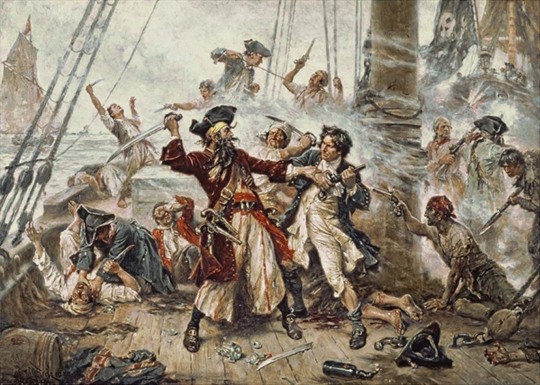
Capture of the Pirate, Blackbeard, 1718 depicting the battle between Blackbeard and Lieutenant Maynard in Ocracoke Bay, by Jean Leon Gerome Ferris (1863–1930) (x)
Although one might think that they all had a nickname, this was not the case. A very large number of them were also known by their normal, clear names, because it didn't matter to them whether they were known or not, it was all about the prey, and the flag was usually enough to cause fear and terror.
108 notes
·
View notes
Photo
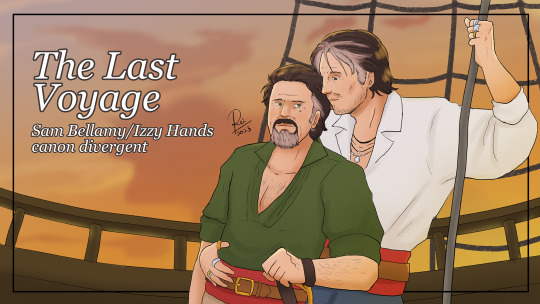
Title: The Last Voyage
Fandom: Our Flag means Death
Pairing: Sam Bellamy / Izzy Hands
Rating: E
Word Count: 116,820
Tags: Israel Hands-centric, Soft Israel Hands, Gratuitous Smut, Fluff, Light Angst, Romantic Comedy but sexier, Original Character(s),canon characters will make appearance, Alternate Universe - Canon Divergence, Edward Teach's Kraken Era
Izzy Hands thought his life was ending when Blackbeard banished him. With no ship and no captain to serve, he was ready to just drink his misery away. Then he met with Sam Bellamy who offered him a chance to sail with The Last Voyage as his first mate.
Hello tumblr! May I offer you a novel length Bellhands I wrote since October? It’s a romcom with smut, so it’s basically a smutty pirate novel. I have tons of fun writing this one. I’m a bit sad that it’s done, but it’s done!
Thank you for those who have read it! Below is some details from the fic so there’ll be spoiler! This my commentary and fun facts about this fic so if you want to read it, do click read more
This fic ending changed so much compared to the ending I wrote in my initial plan. I didn’t plan to write Ed this dark and I def had a plan to make Stede more stubborn and idiotic. I honestly didn’t know why Edward became darker and darker the more he showed up in the stories. I’m still conflicted with Stede’s ending because he became this tragic man whose crime was falling in love with the wrong man at the wrong time. I’m using Flashlight Method when I write so that’s why I always end up in strange plot points.
My original plan is to have Sam rescued Izzy at the end of chapter 9 then he signalled Hornigold to catch Ed and Stede. Izzy was furious when he knew that and in chapter 10, Izzy and QAR would try to save Ed and Stede. This plan no longer work because Ed and also Sam became darker than my original plan :’)
I was planning to include a Treassure Hunter scene to mirror the canon tv show. Sam’s real life collegue Olivier Levasseur was infamous for levig this cryptic message about the whereabout of his treasure. I was planning for Izzy and Sam to find that treasure together. I got a headache planning a treasure hunting
I told @laughingandcryingwhilewriting that I wanted to write a sensual bathing scene. I didn’t get a chance to write one :’)
I implied that Paul was struggling with suicial thought when he was young. That’s why he wore a handkerchief on his left wrist. He kept touching his left wrist when he told Izzy about Maria.
That’s also why Sam didn’t tell Paul about his depression and suicidal thought because he knew Paul was struggling with that issue. Bellhands shippers, we should exploit Sam’s survivor’s guilt in our fic because it’s delicious.
I’d like to think Bones was so self indulgent because if he didn’t focus on himself, he would start thinking about others because he was very emphatetic and it burned him out. He was your burnout health care worker. He was actually stressed 24/7. Dirk and Izzy would help him with his mental health.
Beasley was a bit of blank card for me. I just wanted to make him super chaotic but super competent. He was also super random, which was fun to write. He’s also super into music, which I thought would be funny but it worked out.
Dirk was your typical grandpa who like to give your advice. I really didn’t know why Dutch became such an important language in this fic. I blamed Dirk.
Peddle is my baby. He’s from the same ethnicity as I am. The blessing he gave Izzy at Chapter 10 is actually a prayer for newly wed in my enthnicity language :D
I renamed Queen Anne’s Revenge to New Concord because QAR’s name was La Concorde. I thought I was being clever.
Sam making a deal with Badminton and Rogers is supposed to mimic what Izzy did in canon. Again, I thought I was being clever.
I made a mistake of googling Woodes Rogers and found Rogers in Black Sail. I am in love. That’s why Rogers appears in the beginning of chapter 10
I had an idea of making a sequel to this fic. Rogers didn’t excute Edward, but instead he hired Edward as a pirate hunter so he could sicc Edward at Sam. He knew Sam was a pirate and he knew if he made a move against Sam, he would be fucked. The Sequel would delve more in political situation in The Bahamas and war prep against Rogers. I won’t write the sequel though because I want to write my Billionaire and Coffee Shop Manager AU.
The premise of ths fic is Izzy finally healed through the power of love and friendship. Actually Izzy is the one who healed Sam. Of course, I thought I was being clever.
My initial plan for Stede’s ending was too horrible. If you play video game called Dishonored, Sam was going to do the same thing low chaos!Corvo did to Pendleton Twin.
My take on Sam is he’s usually very generous and kind but he became super cruel to those who wronged him. He tortured someone in chapter 3 and he had someone tied to a mast of a sinking ship. I thought he would want to physically hurt Stede and Ed especially with the burn wound on Izzy’s face. Maybe this is just me trying to justify my choice because I lowkey regret what I wrote.
Paul is the aroace friend who gives great love advices. He told Sam not to sleep with Maria and looked what happened next :<
I almost didn’t write the matelotage. I’m glad I wrote it.
Most of the songs in my LV Playlist are sung by Home Free because my face and voice claim for Sam is Tim Foust.
Please listen to Take Us Home by Alan Doyle. It’s the perfect wedding song for LV Bellhands
Thanks for reading my musings. I just need to let it go. If you have any questions or prompt for Last Voyage Bellhands, do send your question my way!
31 notes
·
View notes
Text
here's what i'm getting from the trailer and teasers so far:
ed starts out Not Doing Well™, crying a lot, drinking a lot, doing drugs, crying some more, etc.
then he and stede meet (NOT in anne's shop, before that. possibly in that scene where ed headbutts him. olu and jim also seem to meet back up when olu is wearing chinese pirate clothes.)
stede fucks it up bc that's what he does best
ed decides he's being wasting his tears for nothing (it's true, but...) and that he's now over stede (he's not).
ed goes on a journey to discover who he could be without blackbeard, which is what he wanted from the start. (the blue-tinted island scenes, the scenes with jackie)
stede keeps trying to fix his mistake with ed (THAT'S where the 'you two know each other' scene in anne's shop comes from)
the navy is being annoying again
either in relation to his mistakes with ed or to the navy bullshit stede decides he needs to become a better pirate. izzy helps. for some reason.
the navy story converges with stede and ed's journies too somehow
and unrelated to ed and stede:
the swede has had enough of buttons trying to eat him and decides to join jackie's polycule. it seems to be going well.
izzy now has a peg-leg which he must be stoked about, stereotypical pirate and all.
the navy guy might be a reimagining of olivier levasseur, considering the prominent fake nose. however, levasseur was french and never served any crown, and this guy seems to be another english navy guy.
7 notes
·
View notes
Text
HEY GANG IM BACK AT IT NEW DAY NEW JAVID CODE
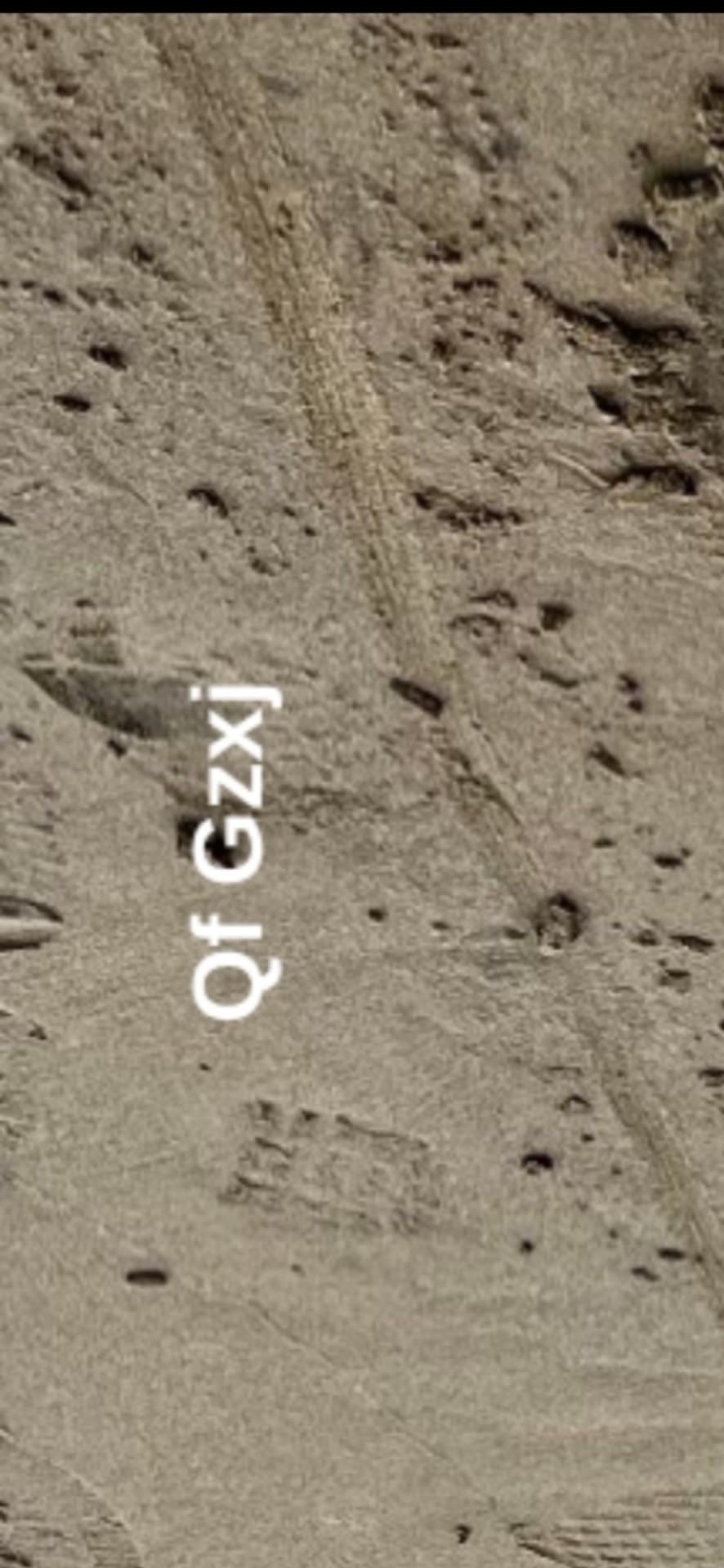
Today's code, found once again in the profile header.
When shifted by five in the Ceasar cipher we get this

Ok so most likely this refers to the pirate Olivier Levasseur, also known as La Buse (the Buzzard)
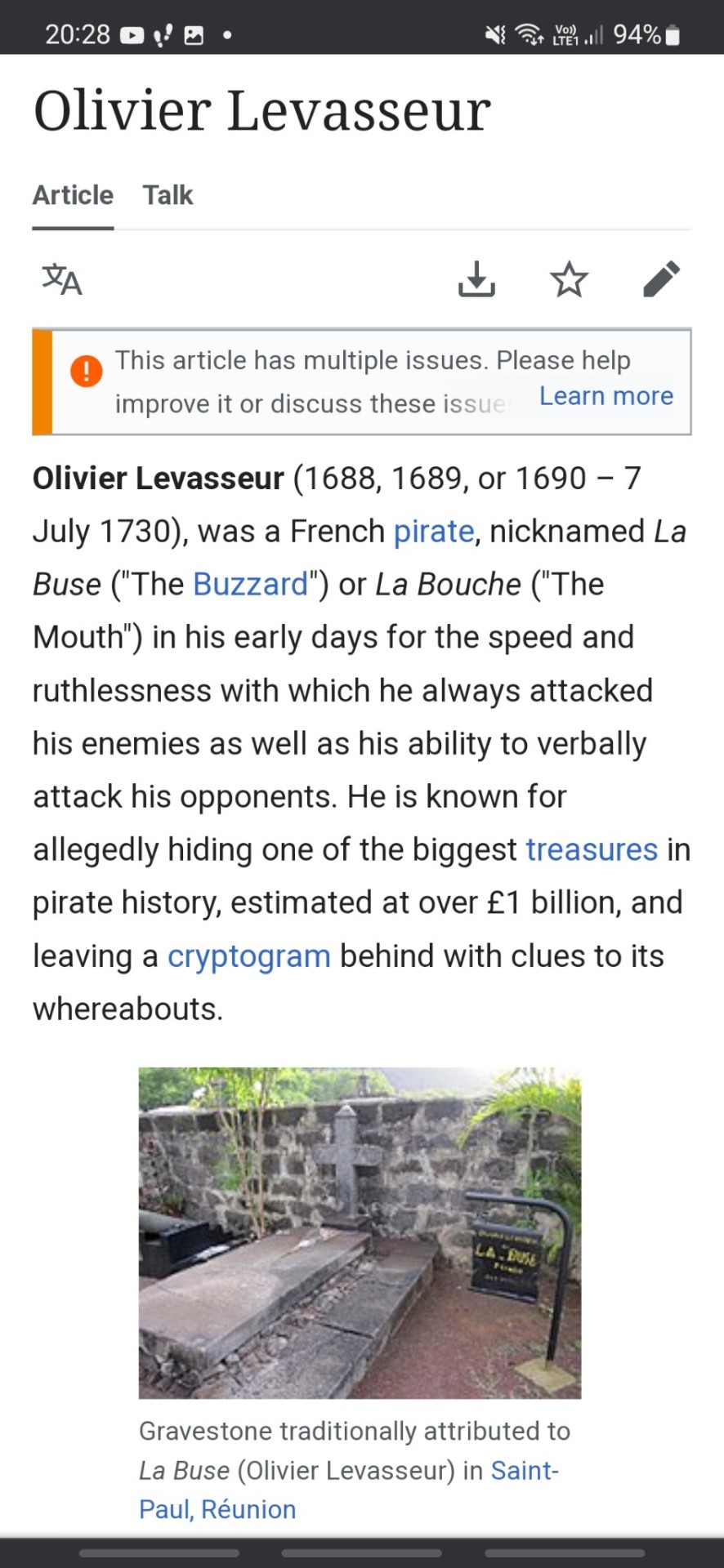
I have literally 0 further theories about this so go wild ig???
32 notes
·
View notes
Text
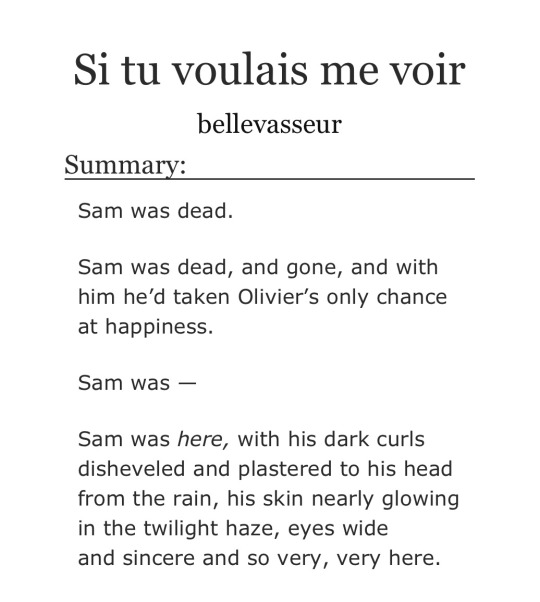
I wrote a bellevasseur fic ~~~~ post S1 emotional smuuuuut.
Find it on ao3 🗡️
#btmd#btmd fic#olisam#bellevasseur#they WILL be happy#that is a threat#Olivier levasseur#samuel bellamy#arg#alternate reality game
3 notes
·
View notes
Text

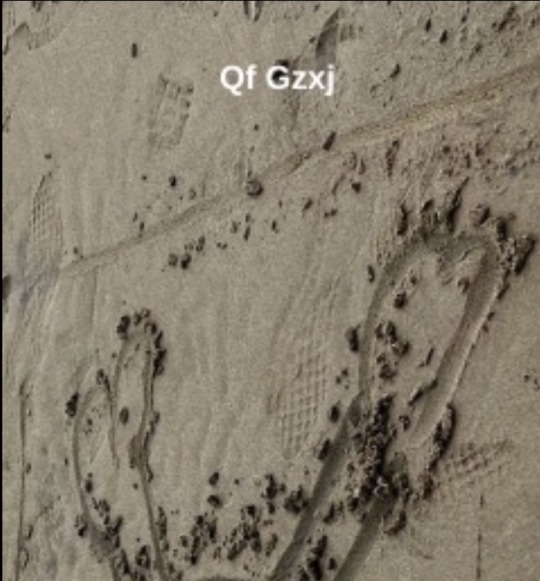
For anyone following the cryptic @javiddenkins blog the header changed
This one translates to La Buse
Looking this up I found a pirate named: Olivier Levasseur
Wikipedia states: Olivier Levasseur, was a French pirate, nicknamed La Buse or La Bouche in his early days for the speed and ruthlessness with which he always attacked his enemies as well as his ability to verbally attack his opponents.
#something about being known to verbally attack opponents sets off alarm bells#but I don’t know why#I’m not a theorist#i’m a idiot#ofmd#ofmd season 2#javid denkins#our flag means death
14 notes
·
View notes
Text

on the right side of @javiddenkins header, rotated 90 degrees to the right
killed by a
jungle cat

* EDIT okay yes it is a pigpen cipher which we have seen before in Olivier Levasseur's puzzle. The only source I've found for this variant is from Assassin's Creed (?)
7 notes
·
View notes
Text
Prove It
by BlowTheMeDown
Olivier and Sam have been having a blast together in the jungle, but will the spark ever become flames?
Words: 905, Chapters: 1/1, Language: English
Fandoms: Blow the Man Down (TV)
Rating: Explicit
Warnings: No Archive Warnings Apply
Categories: M/M
Characters: Olivier Levasseur | La Buse, Samuel "Black Sam" Bellamy
Relationships: Olivier Levasseur | La Buse/Samuel "Black Sam" Bellamy
Additional Tags: Smut, Getting Together, First Time, Modern AU, Alternate Universe - Modern Setting, Frottage, No beta we die like that Red Flag Fleet scout ship, ARG, Alternate Reality Game
source https://archiveofourown.org/works/46004917
3 notes
·
View notes
Text
0 notes
Text
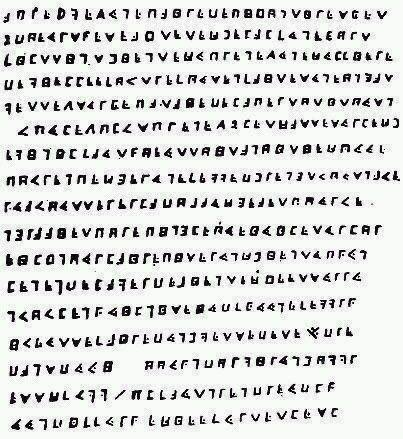
En 1730, el pirata francés Olivier Levasseur fue condenado a la horca. Justo antes de su ejecución, lanzó de repente una nota con un criptograma a la multitud, gritando: "¡Encontrad mi tesoro si podéis!". El tesoro aún no se ha encontrado.
0 notes
Text
Pirate a l’Ile Bourbon : Olivier Levasseur dit La Buse
Chasse au Trésor à La Reunion !!!!!
En 1721, en rade de St-Denis, il découvre un navire portugais en réparation, le Nossa Senhore, chargé de fabuleuses richesses accumulées à Goa et aux Moluques : rivières de diamants, bijoux, perles, lingots d'or et d'argent, soieries. Un trésor considérable. Ce sera la plus grosse prise de l'époque de la piraterie.
Toutes les grandes histoires se terminent mal en général. La Buse sera capturé puis jugé. Le procès est rapide. II est condamné a être pendu et exécuté devant l'église de St-Paul à La Reunion, en 1730. II aurait lâché à ses gardiens : "Avec ce que j’ai caché ici, je pourrais acheter toute l'île." On dit aussi que, lorsqu'il était sur l'échafaud, la corde au cou, ii aurait jeté un mystérieux cryptogramme dans la foule en s'écriant : "Ma fortune a qui saura la prendre".
Un mystérieux cryptogramme pour une chasse au trésor
Ce sera le début d'une gigantesque chasse au trésor. Même le grand-père de Le Clezio, le célèbre écrivain originaire du coin, passa 20 ans à creuser dans une ravine. Bien d'autres chercheurs de trésor tentèrent leur chance, sans succès. Ce cryptogramme, vous le trouvez sans problème sur internet. Grâce à l'invention récente de l'intelligence artificielle, vous pouvez tenter votre chance pour en casser le code secret, toujours inviolé.
À Saint-Paul, ne manquez pas le cimetière marin. Quel calme, quelle beauté, face à la mer. Là se trouve la tombe de ce célèbre pirate, Olivier Levasseur, surnommé La Buse, dont la plaque mortuaire se trouve face à l'entrée nord. Elle se signale par un petit canon en bronze et par une croix de basalte sombre, gravée d'une tête de mort, bien sûr. En fait, comme bien des pirates, La Buse n'a pas eu droit à une sépulture. D'ailleurs le cimetière fut érigé bien après sa mort, ce qui rajoute un peu de piment a ce personnage bien mystérieux.
https://t.co/QkM9NNlHao
#breizh#bretagne#brittany#french#cotesdarmor#english channel#france#st cast#pirates#corsair#skull#mystery skulls#skull island#skull and bones#bulk and skull#skullhead#bourbon#island#reunion#iledelareunion#louis xvi#xviiie siècle#king louis xv#the hanged man#Kelly flag#jolly roger
0 notes
Text
To the attack!

A pirate, a mysterious code, a lost treasure. This is the story of Olivier Levasseur. Captain, my captain.
Olivier’s birth in Calais during the Nine Years’ War remains shrouded in mystery. Some claim it was on May 12, others insist it was May 14, and still, others assert that even the month is uncertain. Born into a bourgeois family, he enjoyed a stable economic upbringing and was given an impeccable education. Initially, he pursued a career as an architect, at least according to official Navy sources. However, his interests soon turned to more daring pursuits.
In 1708, Olivier managed to obtain a letter of marque from Louis XIV, granting him a licence to act as a privateer. While his actions were technically sanctioned by the French crown, he appeared unconcerned by such matters. After the War of the Spanish Succession, the king ordered Olivier to return to France with his ship, but Olivier had other plans. In 1716, he rejected the king’s command and instead joined Captain Benjamin Hornigold’s pirate crew, transforming himself from a legitimate privateer to a full-fledged outlaw pirate.
Captain Hornigold was a formidable figure during the Golden Age of Piracy, and despite the era’s decline, he still managed to make a name for himself. He began his piracy career in 1713 by attacking merchant ships in the Bahamas. In no time, he gained enough power to play an active role in establishing the infamous “pirate republic” of Nassau.
In 1717, Hornigold became captain of the highly sophisticated Ranger, and it was on board this ship that he appointed Edward Teach, better known as Blackbeard, as his second-in-command. Hornigold’s influence continued to grow, until he ultimately accepted the general amnesty offered by George I, and turned his focus to pirate hunting. His first target was his former ally, Edward Teach, who tragically died in battle without being captured.
Despite his success, Captain Hornigold’s life came to a sunned end in 1719 when he was killed in a devastating shipwreck. His death marked the end of an era, but his legend as a daring and influential pirate captain lives on.
Yet, these tales of Captain Hornigold’s exploits were merely a tangent to the uncertainty that Olivier faced upon his arrival in 1716. Levasseur proved to be an exceptional pirate and a valued shipmate. In fact, he quickly earned two nicknames, The Buzzard and The Mouth, due to the swift and merciless manner in which he dealt with his adversaries.
The crew of Hornigold, as we already saw, began to disintegrate after a year of successful piracy, and Olivier found himself briefly travelling with Samuel Bellamy, who became known as “The Prince of Pirates” and is still remembered as the wealthiest pirate of all time.
The encounters with powerful personalities that Olivier experienced throughout his pirate career undoubtedly provided him with a wealth of valuable experience. When he finally ventured out on his own, his efforts proved fruitful as he attacked and captured numerous ships while sailing southward along the Brazilian coast aboard La Louise, a frigate the had stolen to start his true pirate career. However, his success was short-lived, as on March 9th, 1718, La Louise was caught in a fierce storm and sank, taking 80 crew members with it. Olivier managed to save himself on a small brigantine that was serving as an escort and made his way to Sao Francisco do Sul, where he wasted no time in plundering a ship full of flour to feed his remaining crew. The journey continued northward, with raid and robberies punctuating their progress, until they finally reappeared in Jun aboard a small ship that they had stone while sailing up the coast of Brazil.
It was when Olivier arrived in the Caribbean that his luck almost ran out. The HMS Scarborough came close to capturing him, but they narrowly escaped once again, this time aboard a small sloop that he had managed to load with much of the treasure he had accumulated. After replenishing his crew and restoring command, the raids continued, with Oliver’s pirates not only targeting numerous ships but also destroying the fortress of Ouidah, leaving little more than smouldering ruins in their wake.
The year 1720 brought a turn of events for Olivier as he faced yet another shipwreck, this time along the treacherous Mozambique Channel, leaving him stranded on the remote island of Anjouan. The injury he sustained in his eye, a scar from a previous encounter, had rendered him completely blind in that eye. Olivier was forced to wear a bandage over his eye, a symbol that would forever be associated with piracy. Despite his misfortune, Olivier refused to give up and continued his pursuit of treasure and adventure, always one step ahead of the law.
Despite facing numerous setbacks throughout his pirate career, Olivier Levasseur did not let adversity defeat him. Instead, he established a base on the island of Sainte-Marie, off the coast of Madagascar, and recruited a formidable crew of over 750 men across three ships. Their first target was the Laccadive Islands, a cluster of small islands with ample opportunities for piracy. They sized all valuables in sight and ultimately sold their loot to the Dutch for an astounding sum of 75,000 pounds, a fortune in those times.
Olivier’s Jolly Roger, with its black skeleton on a white background, becomes a symbol of fear and recognition across the seas. It was rare for Jolly Rogers to be made with a white field and not with inverted colours.
But Olivier’s successes continued. In fact, he managed to carry out one of the most sensational raids of his career. On a fateful day, Olivier and John Taylor set their sights on the Virgin of Cape, a galleon carrying the treasures of the bishop of Goa and the viceroy of Portugal, who had made the ill-advised decision to travel together towards Lisbon. It happened on April 26, 1721, a date that would go down in history as one of the most sensational hits in piracy. The two pirate captains approached the Island of Reunion, then called the Island of Bourbon, and launched an attack on the galleon.
With a stroke of luck, the crew had thrown all 72 of its cannons overboard during a storm, leaving the ship defenceless. Olivier’s pirates boarded the ship without firing a shot and seized the incalculable treasure on board.
On board the Virgin of Cape, Olivier and his men find a true fortune: gold, silver, precious stones, and the most exquisite fabrics. The value of the loot was estimated at around 100 million pounds, a sum that was almost unheard of at the time. The success of the operation was not only due to the favourable circumstances but also the tactical skills of Olivier and his crew. They knew how to approach the ship discreetly, without attracting attention, and how to take control of it.
The daring act of Olivier and his crew has been enshrined in the annals of history and literature, with none other than Robert Louis Stevenson immortalizing it in his classic novel Treasure Island. The feat is attributed to the beloved character of Long John Silver, forever cementing the legacy of Olivier and his fellow pirates in the realm of mystery and adventure.
The spoils of the capture were nothing short of legendary. The haul included gold and silver bars, chests filled with gold guineas, precious diamonds and pearls, exquisite silk fabrics, masterpieces of art, and even sacred objects from the Cathedral of Goa. Among the treasures was the fabled Flaming Cross of Goa, a massive golden slab, adorned with precious stones, measuring over two meters in length. It was so weighty that it took the combined strength of three men to drag it aboard Olivier’s ship.
The loot was so astonishingly abundant and incongruous that the pirates, in an unprecedented and unique move, did not even bother to rob the passengers of the galleon, since their pockets were already filled to the brim with wealth beyond imagination.
After the treasure was divided, every member of Olivier’s crew received a staggering amount of wealth. Each pirate was entitled to 50,000 pounds in gold guineas and 42 diamonds per person. Olivier, being the captain and leader, kept the magnificent gold cross as his own share of the loot. The galleon, formerly known as the Virgin of Cape, was re-christened The Victorious and became Olivier’s new flagship.
As Olivier began to contemplate the amnesty offered to all pirates on the Indian Ocean in 1724, he sent a representative to discuss the terms with the governor of the island of Reunion. However, the authorities demanded their share of the loot, causing Olivier to refuse the offer and disappear with his treasure to an unknown location in Seychelles.
The idea of pirates burying their treasure is a romanticized notion popularized by literature and movies, and it rarely happened in reality. However, in the case of Olivier and his legendary haul, it seems plausible that he may have stashed some away as a bargaining chip in case he needed to negotiate with the French authorities for his freedom. Unfortunately, negotiations proved fruitless. In 1725, Olivier attempted to make an honest living in Madagascar but was soon recognized by locals and drawn back into piracy.
The story of Olivier took a dark turn as he was eventually caught near Fort Dauphin, Madagascar, and transported to Saint-Denis, the capital of Reunion, to face a grim fate. The once-great pirate, who had eluded capture for so long, was now to be hanged for his crimes.
The story of Olivier Levasseur and his pirate crew is one filled with robberies, looting and a treasure so large that it seems almost mythical. But the true mystery lies in what happened to that treasure after Levasseu’s capture. Despite being subjected to torture and threats, he refused to divulge its location. However, in a moment of solitude, he wrote it down on a sheet of paper… in code. As he stood on the scaffold with only the executioner for company, he wore a necklace containing a cryptogram with 17 lines. He tore it off and threw it into the crown, shouting, “My treasure is yours, you who will understand!” And though the necklace is lost to time, the cryptogram remains. It has been verified as authentic by the British Museum. But what does it reveal? The answer to that question remains one of the greatest unsolved mysteries of pirate lore.
It was a chance discovery that could potentially unravel a centuries-old mystery. In 1923, a woman named Rose Savy stumbled upon some enigmatic carvings on the rocks of Bel Ombre beach on the island of Mahé in Seychelles during low tide. The symbols etched onto the rocks were intriguing: a dog, a snake, a turtle, a horse, a fly, two hearts united, a lock, an urn, a young woman and the head of a man. It didn’t take long for word to spread, and a notary in Victoria immediately suspected that the carvings were linked to piracy. This led to two possible connections – one of which was the treasure of Bernardin de L’Estang, another infamous pirate who claimed to have discovered part of Olivier’s riches after his death.
Further investigations led to the discovery of two letters written by Olivier himself, one to his nephew and the other to his brother. In the letters, he spoke of having collected several treasures and losing many documents during a shipwreck. He also mentioned a map from 1735 bearing the inscription “property of La Buse (Levasseur)”. The letters contained a key to the combinations and other documents necessary to find the remaining four treasures. Olivier’s dream was for his brother’s eldest son to search for the treasure and rebuild their home. The commander had the three documents required to fulfil Olivier’s dream.
The search for Olivier Levasseur’s treasure continued to haunt the notary and Rose Savy. Despite their best efforts, they were unable to unearth any sign of the elusive riches. However, they did find something else – two coffins containing the remains of two pirates, easily identified by the gold rings in their left ears. A third body was also found, without a coffin. Many believe that these were the men who aided Olivier in hiding the treasure and were killed so that its location would remain a mystery forever. The discovery only deepened the mystery of the treasure, leaving everyone to wonder what secrets the graves might hold, and what else remained hidden on the island of Mahé.
The hunt for pirate treasures on the island of Mahé in Seychelles has been a never-ending adventure. For centuries, treasure hunters have scoured the area for the elusive fortune, but it remains hidden. One of the most dedicated seekers was Reginald Cruise-Wilkins, who spent years deciphering clues left by Rose Savy.
Reginald believed that the code to finding the treasure was connected to the Zodiac, the Key of Solomon, and the 12 labours of Hercules. He claimed that to locate the treasure, one had to complete 12 tasks in a specific order, but he died in 1977 without having deciphered the final part of the code. His son John inherited his father’s dream and continued the search for the pirate treasure.
John is convinced that the treasure chamber is buried and protected by the tides and that it can only be found by approaching with caution. He has already completed 10 of the 12 tasks, and he is sure that the treasure is located in a specific and untouched spot. He estimates the value of the treasure to be around 1.4 billion dollars, and he sees it as the “Holy Grail of treasure hunters.”
However, John’s excavations have been blocked by the government since 2009. They insist that he must obtain a license to dig, and whatever he finds, 50% belongs to the state. But John is undeterred and is getting ready for a new research. He is sure that he has figured out where the cave containing the treasure is, but he fears that there is still one last complicated trap inside.
The treasure chest remains hidden, but John remains determined. He hopes that, in memory of all the treasure-thirsty pirates before him and after so much sacrifice and hard work, he will eventually open it. It’s a sentiment that he believes Olivier would agree with.
Sources:
https://escales.ponant.com/en/pirate-la-buse-2/
https://www.reddit.com/r/nonmurdermysteries/comments/n8iuw7/legend_tells_of_a_pirate_named_ olivier_levasseur/
1 note
·
View note